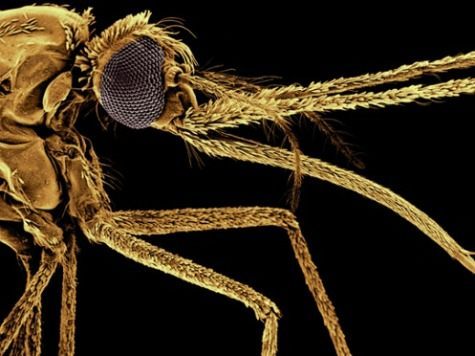A new study has found that, in addition to causing thousands of deaths and continuing nearly unabated in parts of West Africa, the Ebola virus has resulted in at least 74,000 cases of malaria going untreated, with those infected too fearful of being quarantined for Ebola to seek medical care.
According to a new study published in The Lancet, the number of people dying of malaria in Guinea may exceed the 2,444 Ebola deaths in that nation soon, should the disease continue to spread without treatment. An accurate estimate of the number of people who died of malaria in 2014 has yet to be released, largely due to lack of treatment and resources rerouted to fight Ebola. The 74,000 people who did not seek treatment for malaria largely avoided it, the study argues, because malaria symptoms appear similar to those of Ebola, particularly the high fever, and infected persons feared being quarantined for Ebola without being tested.
The number of cases of malaria treated by medical professionals in Guinea dropped 69% in the past year. The number of people seeking treatment at clinics dropped up to 42%.
The fear of being sent to an Ebola treatment center represents compounded fears of various potential negative consequences, from being quarantined with a disease the patient does not have to contracting the disease while in quarantine with actual Ebola patients. “Since the start of the Ebola epidemic people with fevers have avoided clinics for fear of contracting Ebola or being sent to an Ebola treatment centre,” said Dr. Mateusz Plucinski, the study’s lead author.
Being misdiagnosed with Ebola could not only result in contracting Ebola from others in quarantine, but in going without treatment for another deadly disease, resulting in the same worst case scenario as not receiving treatment at all. It is believed that a number of people in Guinea, Sierra Leone, and Liberia died of unrelated diseases while being quarantined for Ebola at the height of panic regarding the outbreak. Ebola, as the researchers warn, is easy to misdiagnose, as it produces flu-like symptoms. The first American to die during the Ebola outbreak, 24-year-old Nathaniel Dennis, fell into a fatal coma after suffering a seizure, but rather than receiving neurological treatment, he died quarantined at an Ebola center.
The World Health Organization is recommending all Ebola treatment facilities also equip themselves with medical technology to combat Ebola and treat the diseases simultaneously to avoid misdiagnoses and potential malaria outbreaks. This coincides with recommendations in The Lancet study, which reads, “Efforts to reinforce malaria care delivery in Guinea should be focused on reconnecting healthcare workers and health facilities with the communities they serve and whose trust they need to regain.”
The news of malaria presenting a significant danger to Guinea does not mean doctors are no longer expected to focus on Ebola or that the Ebola outbreak has concluded. Guinea is experiencing a rise in Ebola cases after a drop that made many medical professionals optimistic. Officials are citing a combination of free travel within the country and disregard for safe burial practices as contributing factors to the resurgence of the disease. “People who have come into contact with Ebola but have not been identified, they go to another village and only then develop the symptoms of Ebola and then contaminate others,” Guinea Ebola response worker, Dr. Amadou Talibe, told the Associated Press.
Sierra Leone’s capital, Freetown, diagnosed three cases of Ebola on June 17, after nearing the 21-day deadline to be declared Ebola-free. Six individuals not exhibiting Ebola symptoms, but who came in contact with the new patients, have been quarantined.

COMMENTS
Please let us know if you're having issues with commenting.